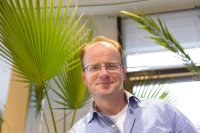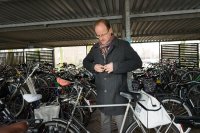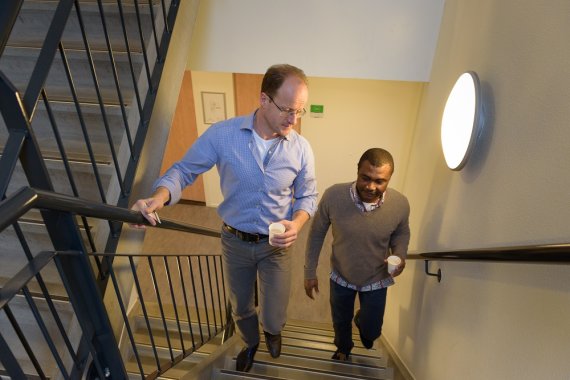Photos Guy Ackermans
In 2011 the Dutch science institution NWO gave professor of Development Economics Erwin Bulte one and a half millions euros to find out which institutions – including formal and informal rules and organizations – contribute to agricultural development in Africa. Professor Bulte’s approach to this task includes experiments in which a few African villages received a certain drug or a bag of money, and others didn’t. Researchers then recorded what happened. This is a controversial new approach in the field of development aid, where ‘people often just muddle along’, in Bulte’s view.
Not that the development economist has come up with a new blueprint for how things should be done in development cooperation. He is a micro-economist who studies economic interactions at the village level. His research is a series of theses in which PhD students expose processes and power structures.
Soft get-togethers
‘One of my PhD researchers has looked into whether stakeholder platforms play a role in local development in eight African countries. In these platforms we encourage producers, transporters and processors in the food chain to collaborate, so that they obtain better access to artificial fertilizer or the market, for instance. Those platforms may sound like soft get-togethers but to my surprise they proved successful. Villages with a platform achieve more innovation and higher levels of food security than those without.’
In another experiment a number of villages were given 600 dollars. Bulte: ‘In half the villages this money went to the chief, and in the other half it went to a village council set up by us. The money was intended for facilities such as a school, a community centre or communal latrines. We had heard the stories about moneygrubbing chiefs and we expected that the democratic village councils would make a better job of spending the money. But our experiment revealed that the village council achieved less with those 600 dollars.’

Is that blasphemy in the ears of the donors?
‘Yes. Many development organizations make that kind of democratic governance a condition for their projects, and yet they do not perform well. The chief has an extensive network. He gets things done and pockets less money than we thought. But a year later we discovered something else. The village council didn’t achieve much because its projects were being sabotaged by the chief. He did things like discouraging villagers from working on a voluntary basis on latrine construction.’
Bulte’s group did this research together with the Royal Society for the Protection of Birds. ‘Inspired by our experiment, this nature organization decided to run its projects in Africa through the chiefs from now on. The development organizations and the World Bank have created hundreds of village councils in Africa which were supposed to replace the existing power structures with a chief, in the interests of development. But when the project money was spent, these new parallel institutions stopped too. We came to the conclusion that it is better to build on existing institutions. That is why I want to understand how those informal governance systems in the villages work and how you can adjust the system to ensure that poor villagers and potential entrepreneurs get the most benefit out of them. Those informal power relations are crucial in rural Africa, where the state is hardly present at all.’
Do you want your research to have social impact?
‘I could claim that my research leads to better use of development funding. But that is not the main reason I do this research. I really enjoy learning to understand these sorts of processes better. One of the things I have found out is that we have no idea how people learn. We make the assumption: I go to a village, I tell you how to use artificial fertilizer and then you tell others, and the knowledge spreads like wildfire through the village. Very many development projects work on this principle. But that’s not how it works. In Rwanda we gave some of the villagers in what are known as ‘village banks’ lessons about money matters. They used the knowledge and improved their way of working. But when we later brought other people from these village banks together, it turned out they hadn’t learned anything. Conclusion: the course participants didn’t pass on the knowledge. We noticed the same thing in an agricultural project in Malawi. Farmers don’t pass the knowledge on unless they are paid to do so. An awful lot of development projects fail because we assume that our knowledge automatically spreads. And it doesn’t.’
I want people to see that there is serious economics going on in Wageningen
This is more like anthropology than economics.
‘We are in the border zone between economics and anthropology. But unlike much anthropology, all our research is quantitative. We count and measure and put the results into a regression framework so as to calculate correlations and causal relations. This sometimes amazes anthropologists.’
In 2014 the economics journal The Economist called you the best economist in the Netherlands.
‘I’ve been in the top 20 in economist rankings for years but that year The Economist placed more emphasis on quality instead of production and then, to everyone’s amazement, I was suddenly at the top. It makes no difference to me. I know the limitations of these sorts of lists. I do place some importance on being in the top 20, so that people see that there is serious economics going on in Wageningen. My high position is the result of teamwork, and above all the efforts of PhD candidates who collect data under difficult conditions.’
What is Wageningen’s status in the world of economics?
‘In our field, development economics, we are clearly on the radar. But I am often in Oxford and Cambridge too. In Oxford there are two seminars a day for economists; in Wageningen there is one a week. In Oxford nearly everybody attends, to learn from others; here in Wageningen half the staff don’t show up. Let me put it this way: there is plenty of room for improvement in Wageningen. I notice that in tenure track too. At the top universities the staff play a major role in assessing and appointing talented academics. There the staff discuss the quality of the candidate and the significance and innovativeness of their work. We don’t have that here because in Wageningen the staff don’t have the capacity or the authority. So we fall back on spreadsheets and point-counting – this many publications, this many PhD students. I am pleased that tenure track now gives talented people the prospect of an academic career, but we don’t have the capacity here to assess them properly.’
What is your ambition as a scientist?
‘I don’t feel a great need to be the best, but I do want to work in a visible group in a global context, because that raises your chances of new and interesting collaborative projects. In development economics there are top groups at MIT, Yale and Berkeley. If they were to be invited to pick three European research groups they wanted to work with, and we were one of them, then we really would have made it.’
How do you work on quality?
‘I have a young group. One has just come back from Yale, another is at Berkeley, and a third is currently in Oxford. Let them have a good look round and see other ways of doing things. I hope that will be their frame of reference. We shall never be in the same league as those institutions but to be in the European top three in our field is a nice goal. I try to appoint good people from outside Wageningen; only if a Wageningen graduate really is better than the rest do I appoint him or her. Last week we had a Research Day, and four members of staff on tenure track were present. We talked about our publication strategy. Are we going to scratch around for points from Q1 journals which publish a lot of junk, or do we go for the top journals with the best reputation in the field? Only those top journals count if you want to work anywhere else.’
I sometimes take one of the children along if I go to a meeting in Africa
Where does your interest in Africa come from?
For the first time he has to think a moment. ‘I enjoy working there. It’s wonderful there – the people, the landscape and the work. Last summer I went to Uganda on holiday with my wife and three children. And I sometimes take one of the children along if I have to be in Africa for a meeting. Then you take three days extra, to go on safari perhaps. There is something I want to put across to my children. The world is big and very varied – explore it.’
You have three sons and they all play football.
‘Yes, on Saturdays I’m on the sidelines at ONA53 to cheer on my sons of 10, 12 and 15. But above all, I’m a Feyenoord fan. The boys often come along to the Kuip stadium. We’ve got all sorts of Feyenoord merchandise around the house – bedlinen, underwear, scarves. And if Feyenoord performs badly, as it has recently, it affects my mood. Actually it’s quite surprising that I’m a Feyenoord fan, as I come from Amsterdam. My whole family supports Ajax, but my granddad was a Feyenoord man. At birthday parties Granddad was always sent to Coventry by the rest of the family. As a little boy I must have shouted out, ‘I support Feyenoord too! I’m siding with the underdog.’ He laughs. ‘Otherwise, you won’t support Feyenoord for long.’

Is football your main hobby?
‘Well, I played football till I was 20, but I was never much good. I run and I work out. And every year I go walking in the mountains with a group of men, and I love that. Something else I love is birdwatching. When I travel to Africa I always take my binoculars with me. Other than that, I enjoy cooking and good food.’
How do you find the time?
‘I don’t work as hard as I used to. Now I work 40 hours rather than 55. Work just comes to me, I have nice projects, so I don’t need to keep running. As well as that, I want to have time for my children. And I agree with Marten Scheffer, who said in a previous interview: you need time to mess about, to wander around, to ponder.’
What makes you happy in your work?
‘Sometimes I get the chance to close the door in the afternoon and write three pages of a scientific article. Those are my nicest afternoons. There are heaps of ideas and insights in my head at such times, which have come to me while riding my bike or walking the dog. I have to write them down so that I can put them in order and then let go. If I’ve spent an afternoon doing that, I’m a contented person.’
Erwin Bulte
1968 born in Amsterdam
1992 Degrees in Tropical Forestry and Development Economics at Wageningen Agricultural University
1997 PhD in Development Economics, Wageningen
199-2005 Researcher at the University of Tilburg
2005-2014 Professor of Environmental Economics at Tilburg
2005- present Research fellow at the University of Cambridge
2006- now Professor of Development Economics at Wageningen
2007- now Research fellow at the University of Oxford
2014- now Professor of Institutions and Development at Utrecht University
Bulte is married and has three sons.
He doesn’t play the brilliant prof, but that’s what he is
Ruerd Ruben, professor of Development in Nijmegen and research coordinator at LEI Wageningen UR: ‘Bulte is among the top economists in the Netherlands and that is exceptional because he operates in a non-fundamental scientific field. He studies the effectiveness of development aid, but doesn’t spend time trying to convince politicians to improve their policy on it. He is an experimental researcher. The results of his research are often counter-intuitive: development doesn’t work the way most people think it does.’
Gerdien Meijering, now working at the CBS, until last year a LEI researcher working with Bulte. ‘He always had time for me. He doesn’t play the brilliant prof, but that’s what he is, because he was very quick to pick up the issues that were bothering me, put his finger on the sore point and make suggestions for improvement. He also writes well and fast. His papers and research proposals stand out for their clarity; he writes effortlessly, almost nonchalantly.’

